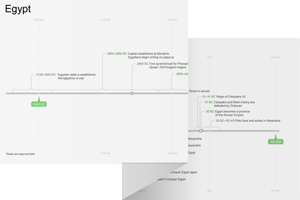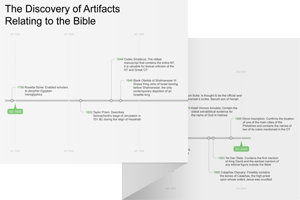19:1 An oracle of Egypt A typical heading for oracles against the nations (see 13:1; 15:1; 17:1; 21:1, 11, 13; 22:1; 23:1).
against the nations (see 13:1; 15:1; 17:1; 21:1, 11, 13; 22:1; 23:1).
 Oracles Against the Nations Table
Oracles Against the Nations Table
Yahweh is riding on a swift cloud The image of Yahweh riding on a cloud is a stock poetic motif also found in Ugaritic literature, where the god Baal is called the “rider of the clouds.” Use of the motif in Hebrew poetry is part of the anti-Baal undercurrent flowing through much of the ot. The biblical writers assert Yahweh’s superiority over Baal by appropriating Baal’s titles and storm god imagery. Yahweh arrives in Egypt with all the fury and splendor of a Semitic storm god.
is called the “rider of the clouds.” Use of the motif in Hebrew poetry is part of the anti-Baal undercurrent flowing through much of the ot. The biblical writers assert Yahweh’s superiority over Baal by appropriating Baal’s titles and storm god imagery. Yahweh arrives in Egypt with all the fury and splendor of a Semitic storm god.
the idols of Egypt One purpose of the oracles against the nations was to assert Yahweh’s dominance over the gods worshiped by the other nations.
May be the descendants of Ham, the son of Noah. Egypt is sometimes identified as the land of Ham in the ot (Pss 78:51; 105:23, 27; 106:22). It is located at the northeastern tip of Africa, forming a land bridge to the continent of Asia. The Nile River is the defining feature of Egypt. Because the Nile flows from south to north, southern Egypt is known as Upper Egypt, while northern Egypt is known as Lower Egypt. Ra, the sun god, was the chief god of the ancient Egyptians. However, many other gods were routinely worshiped, including Osiris, god of the Nile, and Isis, goddess of children. These gods were shown to be inferior to Yahweh through the 10 plagues sent on Egypt (Exod 7–13). Massive temples, including those at Karnak and Luxor, were reserved for the priesthood and were usually off-limits to the laity. A significant aspect of Egyptian religion was that the pharaoh was considered a god. Notable Egyptians include Shishak, the pharaoh who invaded Israel during the reign of Rehoboam (1 Kgs 14:25–26), and Neco, the pharaoh who met Josiah |
19:2 Egyptians against Egyptians Describes civil war; judgment against Egypt will be brought from within.
19:3 they will consult the idols and the spirits of the dead When the traditional counsel fails, the Egyptians will seek out supernatural advice from every possible source.
19:4 I will hand over the Egyptians While Egypt is weakened by internal conflict, they will fall to a strong foreign power.
19:5 the river will be parched Egypt’s agricultural economy was wholly dependent on the Nile River.
19:6 will become little and dry up See note on Isa 19:5. Without the flooding of the Nile, Egypt would quickly revert to a harsh, uninhabitable desert.
19:8 fishers will mourn Not only will food not grow—there will be no fish to catch.
19:11 Zoan Capital of Egypt during the time of the Israelite monarchy—until ca. 725 bc. The city was located in the northern delta region.
the wise of the counselors of Pharaoh God confounds the wisdom of the wisest of people (compare 1 Cor 3:19).
19:13 Memphis The city of Memphis, called Noph in Hebrew, was a prominent political and religious center for northern Egypt. It was used as capital or base of operations by numerous pharaohs.
19:15 head or tail, palm branch or reed The same sequence is found in Isa 9:14–15; the metaphor represents the political and religious elite.
19:16–25 This passage—punctuated by the sixfold repetition of “in that day”—contains another prophetic announcement of the coming day of Yahweh. Fear turns to repentance and repentance to deliverance with the startling adoption of Egypt and Assyria into Yahweh’s chosen people. |
19:16 Egypt will be like women The previous oracle in vv. 1–15 relentlessly mocked the Egyptians for their reliance on sources of power that will ultimately prove worthless when Yahweh comes in judgment. This insulting statement continues that mocking—literally asserting that “Egypt will be like women.” The insult invokes gender stereotypes to call into question Egypt’s confidence in their military strength (compare Nah 3:13; Jer 50:37; Jer 51:30).
19:18 five cities in the land of Egypt The worship of Yahweh will spread from five cities to the entire land of Egypt—it will even include Assyria, symbolizing its spread to the entire world. Jeremiah 44:1 mentions four cities inhabited by Jewish refugees.
that speak the language of Canaan Possibly symbolizes the future prestige of Israel in that the Egyptians—who were prejudiced against Canaanites—will be speaking a Canaanite language. Alternately, the phrase may refer to Jewish refugees who went to Egypt after the Babylonian invasion (including the prophet Jeremiah; Jer 43:1–7), and who spoke a Semitic language such as Hebrew or Aramaic.
Jer 43:1–7), and who spoke a Semitic language such as Hebrew or Aramaic.
19:19 the middle of the land of Egypt Worship of Yahweh was not bound to the land of Israel. At least two Jewish temples were built in Egypt during the exilic period and later.
19:20 a sign A pledge or token presented as an assurance of divine presence (Isa 8:18).
a witness A symbol offering testimony or evidence of an action or agreement (Gen 31:48).
they cry out to Yahweh because of oppressors Compare the plight of the Hebrews and their cry to God in Exod 2:23–24.
he will send them a savior In Exodus, God sends Moses to deliver the Israelites. A similar pattern of oppression and deliverance characterizes the book of Judges (see Judg 3:9).
19:21 Egypt will know Yahweh A continuation of the theme that all the nations will one day worship Yahweh and acknowledge Him as the true God (see Isa 2:2–4).
19:22 striking and healing The striking was evident in the first half of the oracle (vv. 1–15). Discipline and judgment precedes mercy.
he will heal them Repentance brings out God’s compassion.
19:23 a highway from Egypt to Assyria Isaiah 11:16 describes a highway from Assyria built for bringing Israel back to their land. Isaiah 35:8 also envisions a highway creating a clear path for the righteous.
Egypt will worship together with Assyria The two competing superpowers of the day will one day achieve world peace. The imagery presents the world as perfect and ideal after the cleansing judgment of the day of Yahweh.
19:25 The threefold blessing in this verse connects Egypt, Assyria, and Israel, emphasizing a complete and total peace. |
my inheritance The people of Israel were Yahweh’s possession by right. Compare Deut 32:9.

|
About Faithlife Study BibleFaithlife Study Bible (FSB) is your guide to the ancient world of the Old and New Testaments, with study notes and articles that draw from a wide range of academic research. FSB helps you learn how to think about interpretation methods and issues so that you can gain a deeper understanding of the text. |
| Copyright |
Copyright 2012 Logos Bible Software. |
| Support Info | fsb |
 Loading…
Loading…


 Egyptians
Egyptians 

